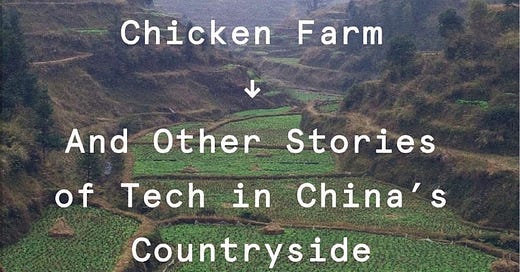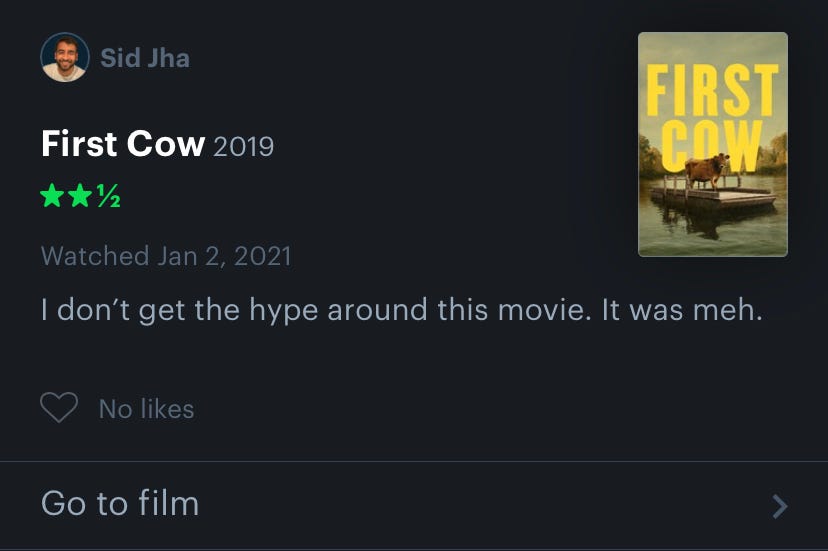Sunday Snapshots (01/17/20) – Blockchain Chicken Farm, Caro's Archives, Letterboxd's ambitions
In which I write the emerging business strategy of a nascent interest-based social network
Hey everyone,
Greetings from Washington, D.C.!
I hope readers in the US are enjoying the long weekend. I’ve been doing some mundane cleaning and cooking the last couple of days – maintenance work that can get missed in end-to-end Zoom calls on a typical work day. I’ve been listening to the Women in Music, Pt. III by HAIM album on repeat (recommendation courtesy of long time Snapshots reader Jackson Bubala) in the background during these chores. The last couple of weeks have been long in every sense of the word for me, so it’s been good to recharge. It’s also been good to take stock of how I am tracking on my resolutions for the year. All in all, it’s been a slow burn week and I’ve really liked it.
With that mini personal update monologue out of the way, in this issue of Snapshots, I want to explore:
Blockchain Chicken Farm by Xiaowei Wang and food insecurity in China
Robert Caro’s archives
The film-based social network Letterboxd’s ambitions
The Manchurian Candidate, Vaccine supply chains, and the Pacific War
Book of the week
In spring of 2017, I participated as an audience member at a competition in college called Cupid’s Cup hosted by then Under Armor CEO Kevin Plank. It was your run-of-the-mill startup competition with a $100K prize for first place. It was exactly the type of event that I liked to attend as a impressionable freshmen trying to figure out what I wanted to do with my life and sincerely believed that college would help me figure it out (lol.)
And it’s the type of event that I would have totally forgotten about if not for one company. This company had attacked a problem area that not only did I not know existed, but I could not even have conceived of existing. The problem was that mother sows often accidentally crush their own piglets to death. The solution was a patch on the mother sow’s that would be voice-activated to the squeal of the piglet and buzz the sow to stand up. It led to a 31% reduction in piglets crushing. Ingenious.
This week, reading Blockchain Chicken Farm by Xiaowei Wang took me back to those moments of wonder at learning about something that I could not even fathom in my urban-centric worldview. When you think of tech in China, you think of Alibaba and Jack Ma. You think of ByteDance and the ubiquitousness of TikTok at every age group. You have also probably heard of WeChat and their parent company Tencent.
This book is not about them – though they are prominently featured in some chapters. This book is about the flourishing underbelly of the technological revolution happening in rural China, mostly focusing on how tech is affecting the traditional occupation in these regions of the country. It is about the dangerous dance of unfettered free-market capitalism at the regional level and the stifling authoritarianism at the national level in the country. It is about how the strains that are put on a country’s social structures when it goes through economic growth seemingly through hyperspace.
Though it focuses on food security, I found out about this book since it had a common publisher with another tech-centric book I have recently written about – Subprime Attention Crisis by Tim Hwang. While Tim’s book made arguments that were akin to a meticulous house of cards (they built upon each other and a failure of any of one argument could have brought down the broader point of the book), Wang’s book is more like a Jenga game in progress. Stories and arguments can be moved around in this book, but they all point to a structure that has been strained by our obsession with optimization.
Wang raises two points that I thought were particularly thought-provoking:
Feedback loop of food safety: One of the core job-to-be-done in the ecosystem that Wang describes is that of food safety in China. With complex food supply chains that are less reminiscent of a simplistic manufacturer -> seller -> retailer model and more reminiscent of the intricate and haphazard cables at the back of your desk, a breakdown at any one node of the system can have significant repercussions downstream. Take the 2008 baby formula crisis as one example:
In 2008, before the Beijing Olympics, several infants in China died from kidney stones, and thousands more were suddenly sick, in critical condition. Investigators quickly traced the cause back to infant formula produced by Sanlu, a dairy company. The formula had been mixed with melamine. Melamine is similar in appearance to milk and boosts protein content. Often used in cattle feed, it is toxic to humans above certain doses.
Economic pressures for ever cheaper prices had led to suppliers mixing melamine in their milk before selling it to Sanlu. That in turn led to lethal results.
So what’s the solution to the general problem here?
Some have suggested blockchain as a way to keep a complete history of the food that you eat across its entire supply chain. The blockchain chickens in the title refer to chickens that are tracked on the blockchain by particular companies. While increasing the price of the chicken, this leads to a greater confidence in the quality of the chicken.
But, as Wang argues, if you step back and look at what happened here, things look more than a bit ironic. Price pressures from a free market model of agriculture created a system where suppliers have to operate in a highly competitive environment which leads to food safety issues. The government, which is supposed to be the stakeholder that acts a middleman to solve trust issues has been ineffective. So, private companies – the very companies created the free market pressures – can now have a monopoly on trust when it comes to food safety through projects like blockchain chicken.
Blockchain concerns: Wang’s objections to blockchain protocols are arguments that are less the usual charges levied against derivative projects like bitcoin and more about the fundamental nature of the work itself. While the general logic of not trusting individuals and instead putting your trust in protocols makes sense, Wang argues that a human being wrote those protocols. Any protocol has trade-offs and what side of a particular trade-off you fall under has governance repercussions since in the blockchain context, code is governance. I’m not sure to what extent I agree with this (one could argue this about literally everything), but it was a differentiated take on a hot topic that I wanted to share.
I definitely liked reading the book, thought I’m not sure if I would recommend it to everyone. It has the undertoned techno-pessimism Uncanny Valley by Anna Wiener, the structural insights of The Seventh Sense by Joshua Cooper Ramo, and the historical narrative flair of Cable Cowboy by Mark Robichaux. It is great read for China enthusiasts and specially China investors as they will certainly find some lucrative theses here.
Long read of the week
What We found in Robert Caro’s Yellowed Files by Dan Barry
Over the course of this newsletter, no author has featured more than Robert Caro of The Power Broker and The Years of Lyndon Johnson fame. So far, I have written 7 issues about his books.
And as us Caro-heads wait for the fifth and final volume of the LBJ series (I always say to my more fantasy-minded friends that the series is my Game of Thrones), I will read everything and anything about Caro liked a deprived reader consuming fan fiction.
This particular article concerns the extensive archives that Caro has produced over the projects that have spanned a lifetime. The question is somewhat pressing – as Caro has admitted himself in his most recent book Working, he can “do the math” referring to his age. It goes without saying that I will certainly be a visitor to any and all exhibitions that Caro’s archives are a part of.
In the meantime, let’s get cracking on that fifth book, Mr. Caro!
Thanks to Snapshots reader and friend Rishi Taparia for the scoop.
Business move of the week
On March 1st, 2020 – blissfully unaware of what was coming in approximately a week – I wrote about a new app that I had discovered:
I came across a neat little app that keeps track of the movies that you’ve watched and can help you keep track of the movies that you want to watch. You can also follow your friends or movie critics to see what they’ve been watching. As I’ve gained an appreciation for filmmaking and storytelling, this has been a great way to catalog everything.
That apps was Letterboxd. And while it remains mostly the same in form and function, it’s safe to say that the “neat little app” isn’t so little anymore – it recently had a New York Times profile written about it!
There are three trends that stood out to me from the profile:
The emergence and community recognition of personalities: Users on Letterboxd can use their real identities or be pseudonymous. But when you start looking at their ratings and reviews over a broad spectrum of films, a certain personality starts to emerge. The canonical example for me here is the Reddit user poem_for_your_sprong, appearing (and often summoned) on threads across the entire website with poems in a very particular style. Now, Letterboxd has personalities too. When differentiated expression meets differentiated mediums, new platforms are born.
A distinction between old-school critics and the “Letterboxd-era critic”: There has obviously been a democratization of almost everything through the internet – even the elusive high-brow dams of personal fitness training, art investing, and high-end cuisine have broken down with the uninterrupted tides of hyper-connectivity and a zero interest rate environment over the last decade. Film critics might be the next on the disruption list thanks to Letterboxd. When new spaces emerge, users typically try to copy the old-world rules of what was successful. Perhaps in this case it was “serious” critique on filmmaking, plot, cinematography, soundtrack, etc. But as I wrote above, with a new space comes an opportunity for new kinds of expression that can be successful. With Letterboxd, this can be things like using all lowercase letters or ignoring grammar rules in order to make the reviews more personable and give them a feeling of anti-snobbiness. I’ve indulged in this decadent behavior myself:
The emerge of not just personalities, but that of a “Letterboxd-era critic” is a tell-tale sign that something special is brewing on this platform.
Expansion beyond the core audience and monetization: As a company expands past its core target audience, it faces multiple forks in the road and often chooses the road of complexity – a phenomenon I have co-written about before with Nathan Baschez for his newsletter Divinations. How the company will grapple with this expansion remains to be seen but one can easily brainstorm some possibilities:
Recommendation engines: Right now, the app does not recommend new things to watch based on your previous watching history and reviews. But I can easily imagine you putting down which streaming sites you have subscriptions for and then recommendation being auto-generated for you. This opens the way for paid advertising for movies to be placed on these recommendation lists. One reason to be skeptical here is that watching a movie and then coming back to add a review is not a very tight time loop – it extends over hours. But a simplified version of a recommendation engine is almost an inevitability for the app.
Affiliate deals: If its recommendation for a movie leads to a user subscribing to a streaming service, it should pay Letterboxd a greater amount of money. And once pay-per-view movies become the standard on streaming services, if Letterboxd sends a user to a particular streaming site, that streaming site should pay Letterboxd a cut of that revenue.
Acquisition by a streaming site: In a move that would not be probably good for the platform, a given streaming site or studio could acquire the app and mine its user behavior to design marketing strategies or inform future movie developments.
Paid followings: Create a mini-Only Fans for movie enthusiasts for exclusive or plug in to other platforms like Twitch for streaming movie nights could be seriously supercharge the critics side of the reviews marketplace.
Whatever direction the company takes, it will certainly be one to watch out for in the next few years as a dominant cultural force. In the meantime, you should definitely follow me on the platform and share your favorite movies.
Odds and ends of the week
A movie, an article, and a podcast this week:
🇨🇳 The Manchurian Candidate: To wrap up the movie theme of the latter half of this week’s issue, I watched this classic political thriller from 1962. Great movie and a must-watch for any political movie buff.
💉 Exploring the Supply Chain of the Pfizer/BioNTech and Moderna COVID-19 vaccines: Amidst the reports of unused vaccines, this was a great read on what it actually takes to deliver shots into arms.
🇯🇵 Hardcore History – Supernova in the East V: The release of a Hardcore History episode is a rare, beautiful event and I finally caught up with the show after finishing this harrowing episode about the Pacific War and the island hopping strategy that criss-crossed the entire Asian coast of the ocean. This episode also had close personal significance as it was growing in the Philippines that I visited the World War 2 battlefield of Corregidor and became as good as a tour guide in navigating the different roads and exhibits on display – an early instillation of a love for history that will probably last a lifetime.
That wraps up this week’s newsletter. You can check out the previous issues here.
If you want to discuss any of the ideas mentioned above or have any books/papers/links you think would be interesting to share on a future edition of Sunday Snapshots, please reach out to me by replying to this email or sending me a direct message on Twitter at @sidharthajha.
Until next Sunday,
Sid





